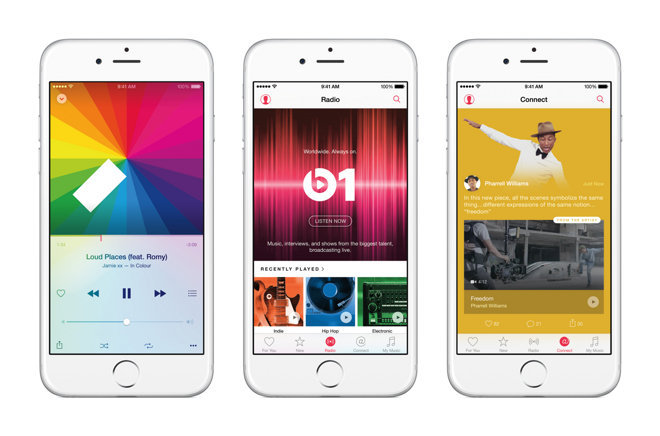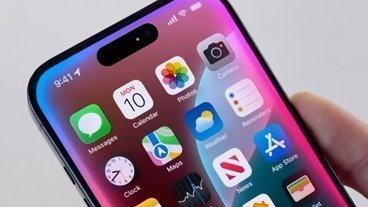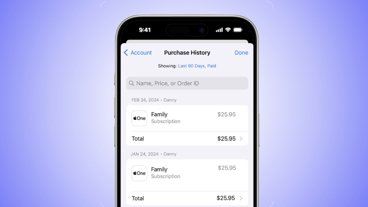A European Commission inquiry found no evidence that Apple colluded with major record labels to impede free-to-stream services as part of the company's Apple Music business strategy, a report said Friday.
Sources familiar with the matter said the EU antitrust watchdog was looking for evidence that Apple colluded with labels to stifle competition from the likes of Spotify, but ultimately determined the dealings to be in the clear, reports Re/code. While it did not find evidence of illegal activity, the European Commission will continue to monitor the streaming industry.
Word of EU involvement first came in April when the Commission sent out questionnaires asking record labels and digital music companies to divulge details regarding potential streaming deals struck with Apple. The inquiry was initiated before Apple Music was officially announced in June.
Today's report notes the EU has since turned its attention to iOS App Store policies and is asking streaming music companies like Spotify about Apple's mandatory fees, restrictions and other potentially anti-competitive guidelines.
In July, the U.S. Federal Trade Commission began its own investigation into allegations that Apple is leveraging its iOS platform advantage and strict App Store policies to artificially stifle competition.
Apple takes a 30 percent cut of all App Store transactions, meaning rival streaming music services selling in-app subscriptions through their iOS apps have to either charge more or absorb the profit loss to stay competitive. This creates a problem for a relatively low margin industry in which companies charge a de facto $9.99 standard monthly rate based in large part on content royalties paid out to record labels.
The problem is compounded by rules restricting the advertisement of billing services outside the App Store, such as Web-based charges. A few companies have tried to thwart App Store regulations to varying success. Spotify, for example, sent out emails notifying iOS subscribers that a switch to Web-based billing would save them $3 per month. Subscribers who signed up to Spotify's paid tier through their iOS app pay a 30 percent premium to offset App Store fees.
 Mikey Campbell
Mikey Campbell








 Wesley Hilliard
Wesley Hilliard
 Malcolm Owen
Malcolm Owen
 Andrew Orr
Andrew Orr
 William Gallagher
William Gallagher
 Sponsored Content
Sponsored Content
 Christine McKee
Christine McKee

 Thomas Sibilly
Thomas Sibilly







93 Comments
Spotify have been lobbying hard, hoping a repeat of the ebook case. The thing is, no amount of government involvement will be able to stop the growth Apple Music will gain at their expense. Although spotify won't say which platform most of their paying users are on, it's easy for anyone to tell. You simply have to compare the two main platforms when it comes to paid apps. iOS holds a 70/30 split for paid apps vs android for paid apps. With that in mind, one can more or less conclude most of spotify paying customers are for the most part, Apple customers.
If that is the case, then spotify is in a much different position then I though just a few months ago. If we learned anything from the Apple maps fiasco is that, as bad as that launch was, it was bad. Some 2+ years later, over 75% of iOS users are using Apple maps over the much better Google provided maps apps. This is happening for one simple reason, "power of the default." If this can happen to a much better product (Google maps), I can confidently say Apple will be able to convert a lot of spotify paying users on their platform.
With competition like this from Apple and all the bad music label contracts, I don't see how spotify can ever hope to become profitable. Unless of course a facebook or someone else with deep pocket come to the rescue.
I predict that Apple will have to change the 30% cut on repeating subscriptions. The problem is these apps are free. Perhaps Apple changes the rule for subscription services to 30% of the first month. But that still doesn't work. Maybe 30% the first month and 10% for consecutive months. It can't be a one time fee because Apple IS incurring costs every month for these other services. It would be unfair to Apple to prevent them from collecting anything on an ongoing basis. Why should Apple absorb the costs of doing business for other companies?
No collusion. I could have told them that. Buy ads, spotify. You're not getting a free ride from apple.
I predict that Apple will have to change the 30% cut on repeating subscriptions. The problem is these apps are free. Perhaps Apple changes the rule for subscription services to 30% of the first month. But that still doesn't work. Maybe 30% the first month and 10% for consecutive months. It can't be a one time fee because Apple IS incurring costs every month for these other services. It would be unfair to Apple to prevent them from collecting anything on an ongoing basis. Why should Apple absorb the costs of doing business for other companies?
Why would they do that?! There are no legal nor business reasons for Apple to change that rule.
I predict that Apple will have to change the 30% cut on repeating subscriptions. The problem is these apps are free. Perhaps Apple changes the rule for subscription services to 30% of the first month. But that still doesn't work...
The commission can't really set prices (unless it is caps for utilities or things considered essential, such as EU-internal roaming fees), and they really shouldn't. Their only concern should be to establish if competition is affected here, and if that is the case, to make sure it won't be in the future.
It is extremely hard to predict how this goes. iOS has far less marketshare in the EU than in the US, in classical prepaid-countries like Italy and Spain it is almost irrelevant. Nobody can talk about a monopoly here. Some competitors, like Amazon, do not allow any competing third party content on their devices (try reading an ePub file or listening to Google music on a Kindle). From this angle, Apple is already among the most open - there is pretty much no service in existence that can't be used on iOS devices. Even the Apple TV allows third party content providers etc. I assume Apple is pretty safe from this point of view. Apple also allows free apps with subscription content paid elsewhere. This is totally free access for competitors, with Apple providing the infrastructure, the development tools, the testing platform, the storefront etc ad inf. Can't be a problem either.
So, the only real question is: how much can you charge for access to a market place? And I predict hell will freeze over if the commission even gets into this. Payment providers, shopping mall operators, airport and seaport operators... all living off freely set fees and commissions for businesses using them, will be royally pissed. As a first result all businesses will demand the conditions of others to be transparent. That would become ugly in no time.
(I too think 30% was OK when the App Store was new, and it is excessive now. But that is not a competition thing, it is a question of something that sells tons of high margin hardware generating an undue amount of additional income. Without developers this place would be dead, so keep the cut around an break-even level. Once there is no relevant profit, the commission will be empty-handed anyhow.)